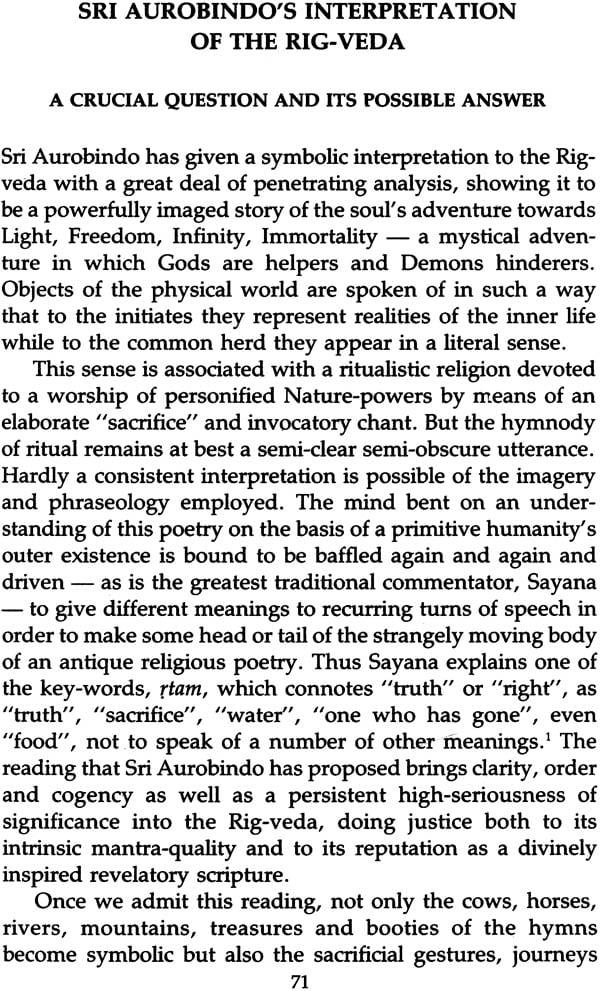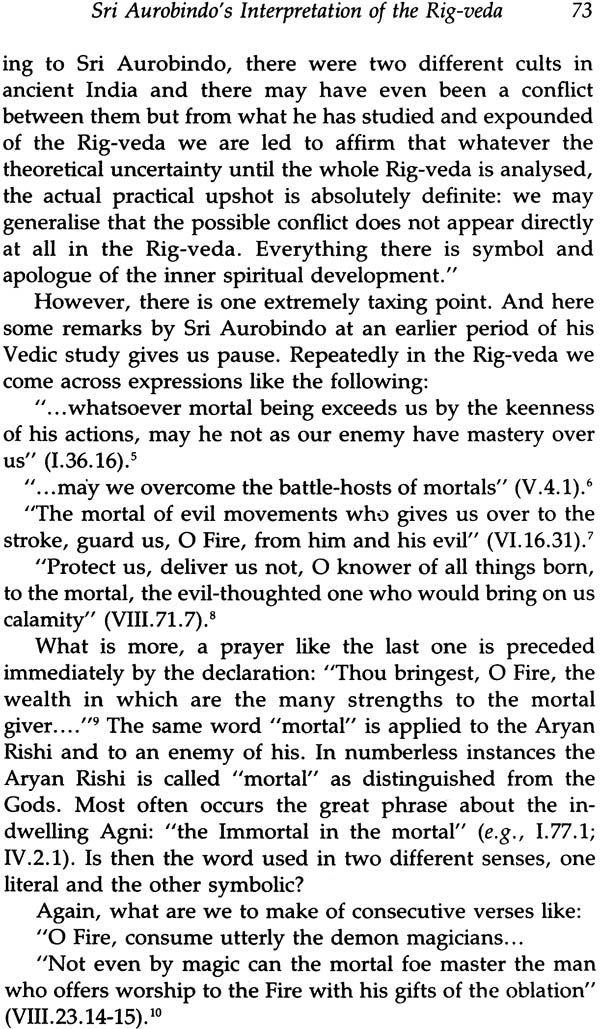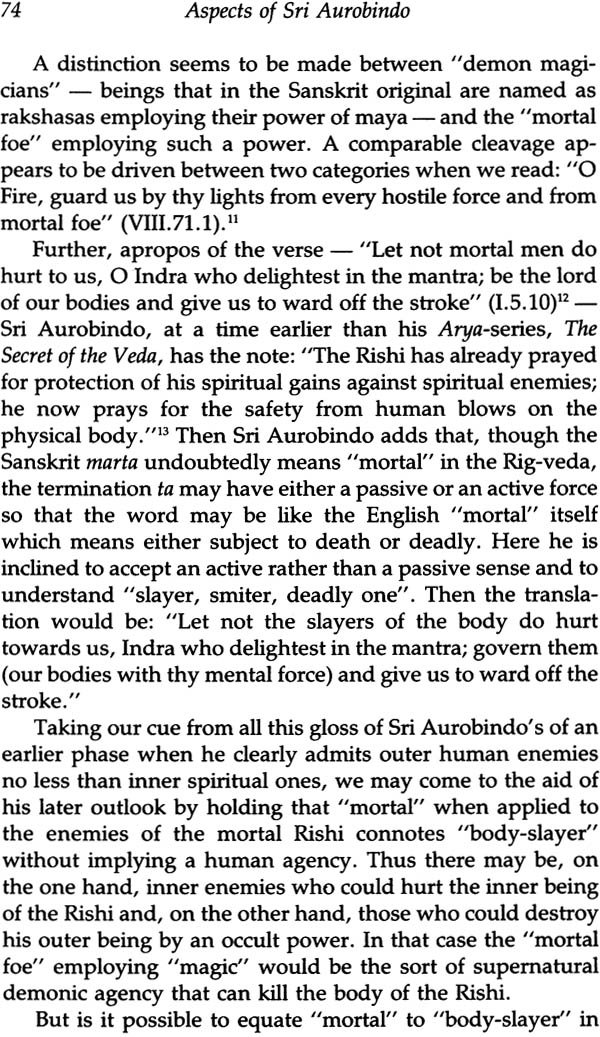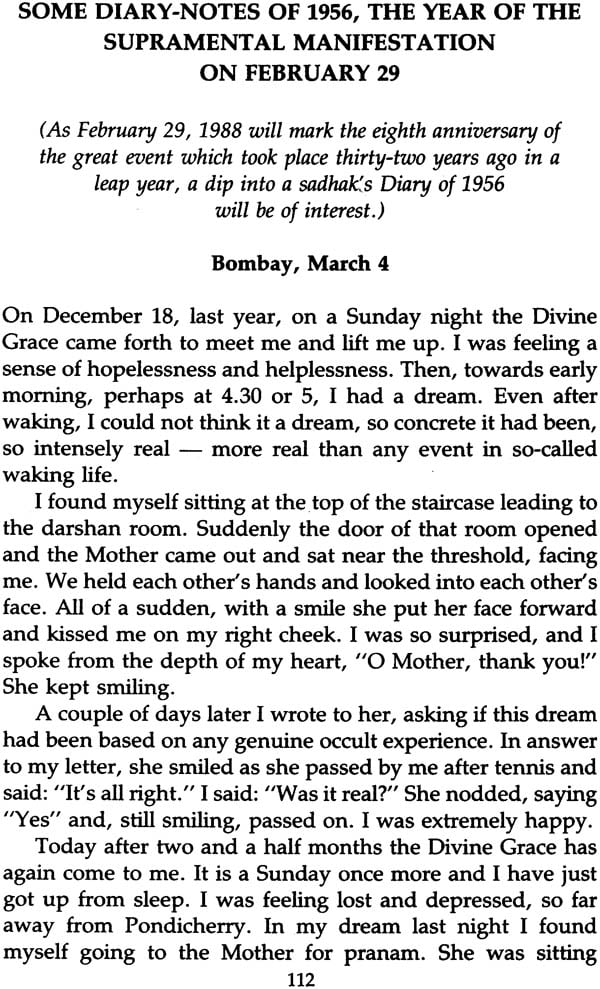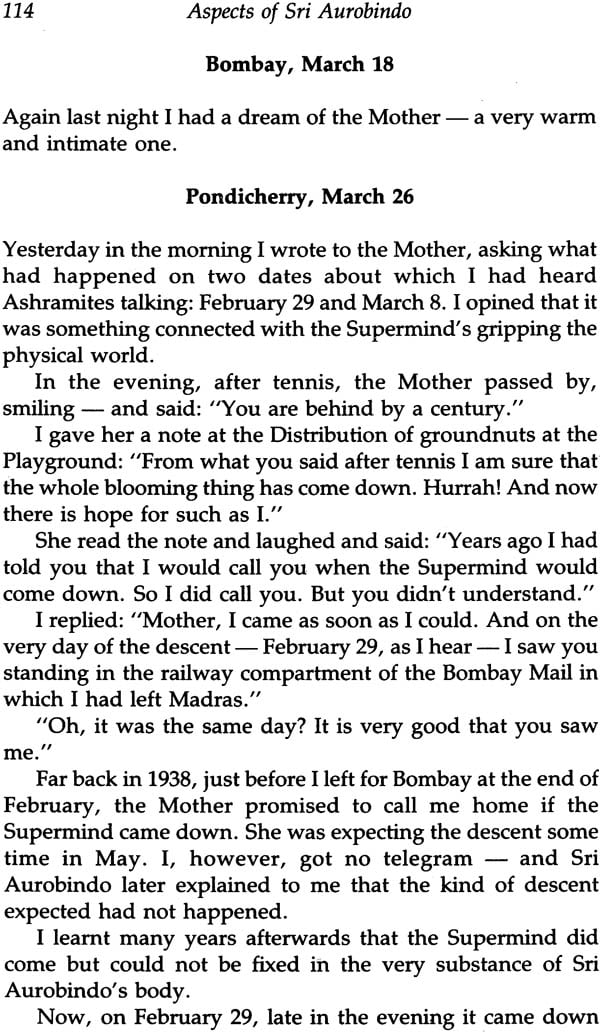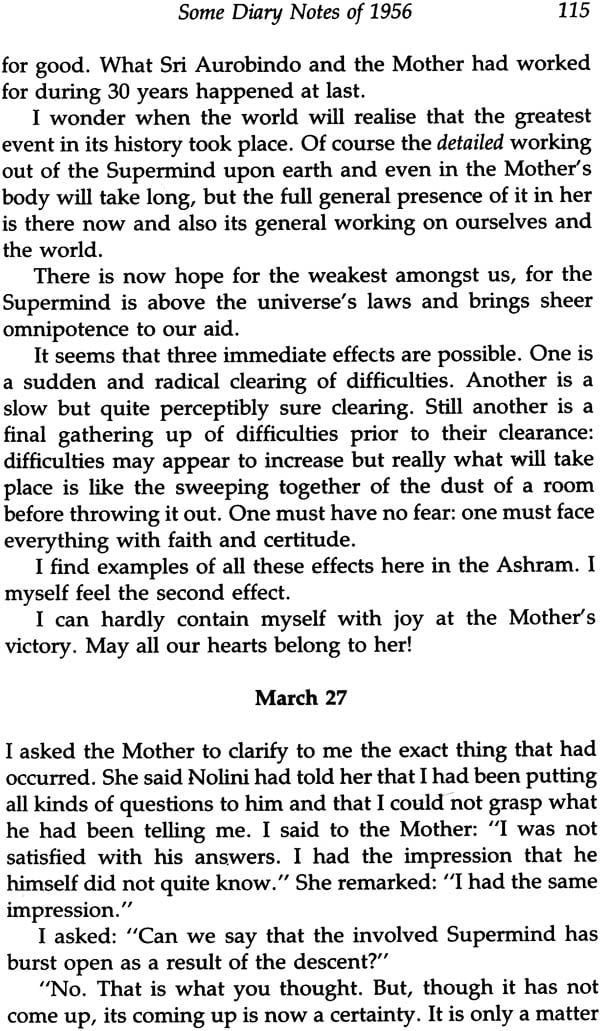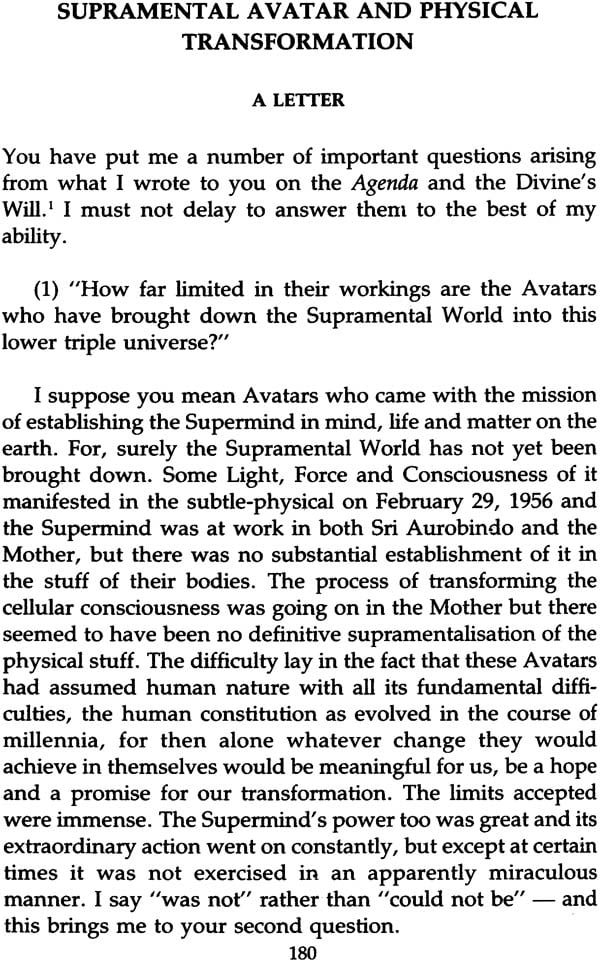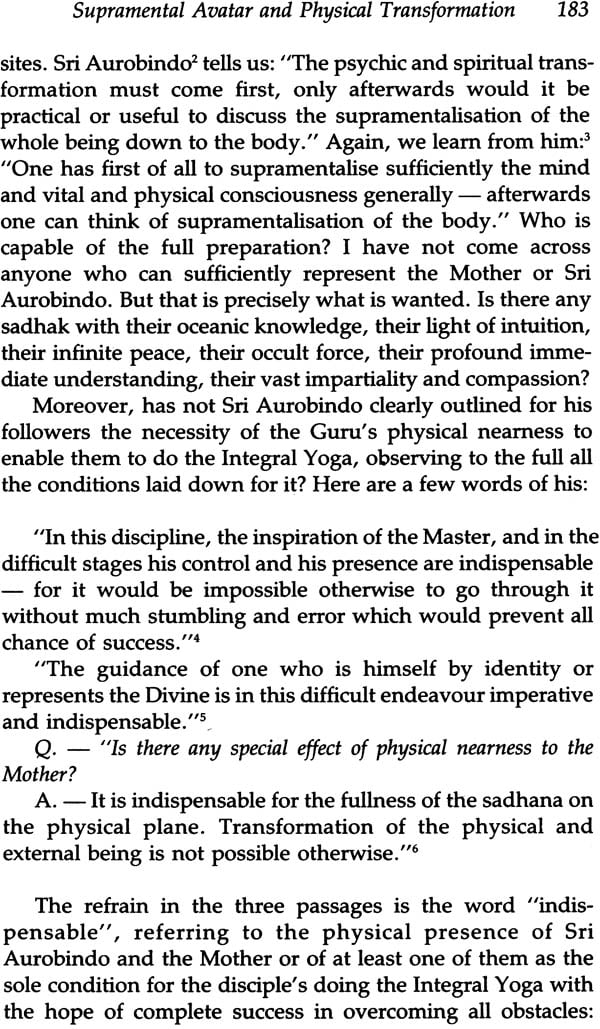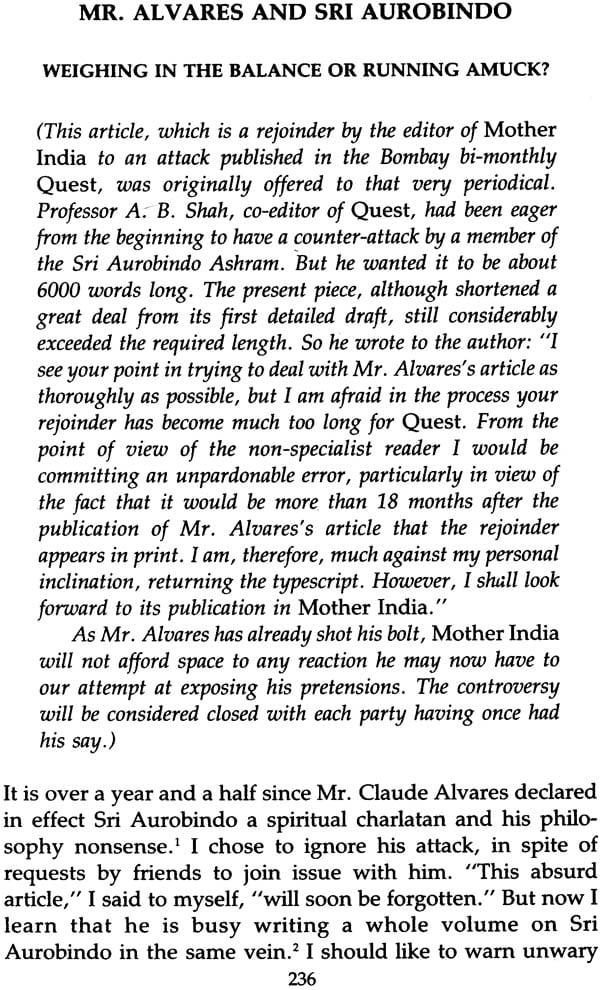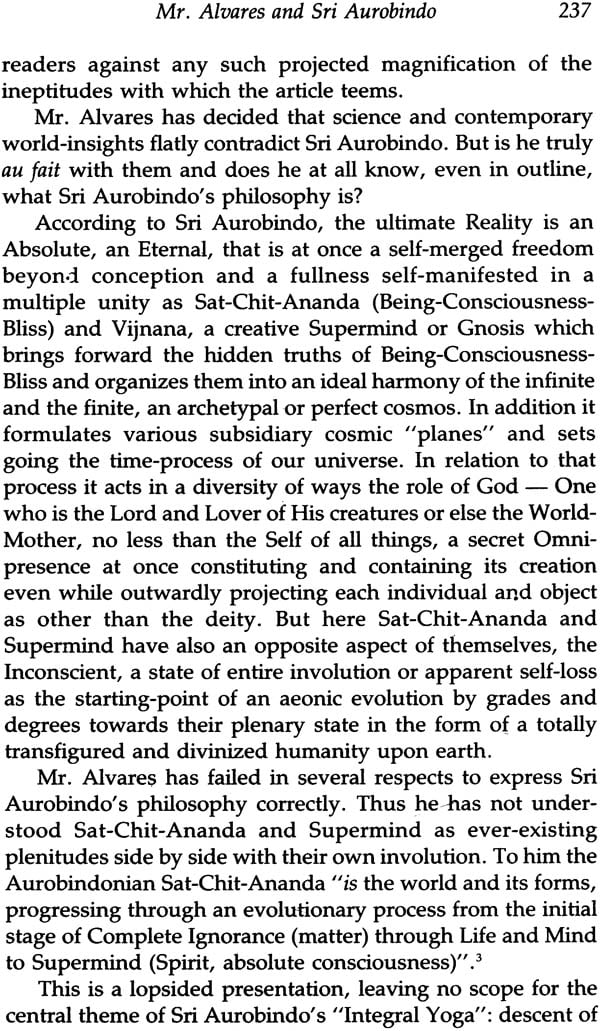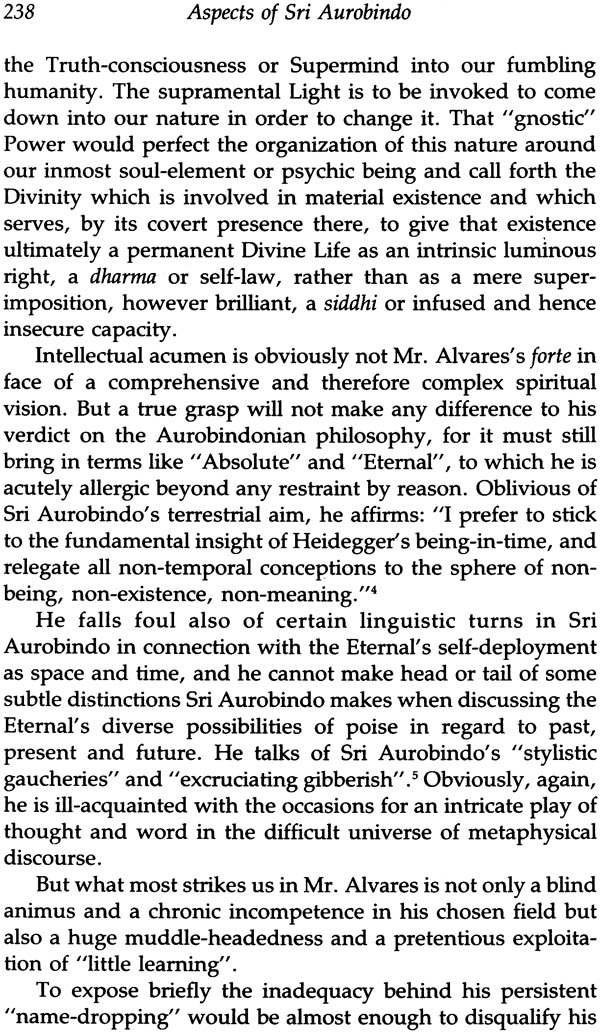
Aspects of Sri Aurobindo
Book Specification
| Item Code: | NAL343 |
| Author: | Amal Kiran |
| Publisher: | The Integral Life Foundation |
| Language: | English |
| Edition: | 2000 |
| Pages: | 281 |
| Cover: | Paperback |
| Other Details | 8.5 inch x 5.5 inch |
| Weight | 390 gm |
Book Description
Unity in Diversity-from Kapila down to Carnap, that is the most comprehensive concept possible to man when he turns a searching eye upon the gigantic enigma presented by the cosmos in which he plays so striking a part.
There have been uncompromising monists of stark, immutable, homogeneous being who have looked upon all diversity as an inscrutable phantasmagoria, and on the other hand implacable pluralists have refused to see any essential unity in the teeming multitude of heterogeneous events which seems to constitute the spatiotemporal process. But in the end these extremes fail to satisfy the integral philosophic sense of the human mind: all life and thought are based on a fundamental recognition of identity and difference, the universal and the particular, the one and the many.
All things tend to indicate a ground of unity just as much as each thing tends to express a unique shade of it: cosmos is at once a universe and a pluriverse. The most satisfying as well as finally inevitable act of both reason and intuition is to affirm and believe in the bedrock reality of a single yet multiply-realised Fact.
However, once we have admitted that it Philosophy seeks to evade this Fact it is always likely to be so much the worse for Philosophy, we must, in order to have a clear insight into the ultimate nature of the bedrock reality, take into account the two poles of evolutionary history – the material existence from which man is apparently sprung and his look upward from which man is apparently sprung and his look upward from it towards spiritual truth. He is, somehow, always subject to the dual attraction of Matter and Spirit. Living and thinking in a physical body, he cannot neglect the demands and necessities of his material nature, its comfort, gratification and development, its insatiable push towards a perfect secular fulfilment. But at the same time there is in him a conviction of something else than his first insistent experience of terrestrial being. Set like flint against the invasion of doubt from a certain part of his nervous psychology which harps on the paramount importance of secular growth is the feeling that life on earth is not the sole reality and that its vicissitudes do not exhaust his entire duration. Soul, Afterlife, God – these intuitions shine out through whatever thick veils he chooses to put upon them: he cannot for long hold them at bay, they persist in returning, in moulding his action as a step towards meriting celestial enjoyment, in suggesting a chain of rebirth as developing his spiritual potentialities in order to deserve an ever more ample heaven and, id too unwisely thwarted, they acquire a morbid hold on him, casting over his whole terrestrial existence hue of futile disorder and incorrigible sinfulness.
Thus, no age of scepticism which denies the Spirit and refuses to investigate sympathetically the date of religious experience can last long; it is condemned to transience by the unconquerable aspiration in man towards the immortal, the infinite, the divine. Neither does any feverish emphasis on other-worldliness give him permanent satisfaction: the moment religion, no matter with what conciliatory compromises, regards in the main a supra-terrestrial sphere as the scene of his final fulfilment it becomes suspect to the equally unconquerable impulse in him towards material self-consummation, individual and communal. What Philosophy has to find is the sovereign equation which perfectly harmonises these two master-passions. The very fact that they are equally inevitable, creating be their perpetual conflict the whole course of man’s advance and destiny, seems to imply that there is such a comprehensive equation possible and that the very instinct of Nature is somehow to arrive at it.
Hence we must take the human aspiration towards the immortal, the infinite, the divine as not just the fallen soul’s home-sickness for a post- mortem paradise but rather as the evolutionary urge by which Nature is striving to produce the superman in whom mind, life and body have received the law and light of a higher Consciousness and Power which have purified, subtilised, intensified and transformed them into perfect images on earth of their own ideality. In that case, Nature is at bottom a supreme Spirit conceptively self extended as the bases and substance of all cosmic existence, a spirit of which the implicit diversity is necessarily of living soul-truths enjoying a play of divine consciousness, force and bliss, and which guides overtly or covertly a phenomenal mould of itself which starts with a complete involution of all its powers in order that they maybe progressively manifested in the terms and figures of their own seeming opposites-apparently inanimate Matter and unconscious Force.
What we call evolution is a process by which the multiplicity of the soul-truths inherent in the Spirit shape various series of formulations on earth for the gradual revelation of their own shades of divine diversity at play in the divine unity. This, again, means that each soul –truth gathers and assimilates through these formulations or rebirths a certain growing experience which helps it to express it diversity on evolutionary lines, and which it holds together in an evolving intermediate psychological form of itself between its pure spiritual status and its expression here. That is to say, midway between the material existence in which life and mind develop because of a hidden Spirit in it and the spiritual existence which contains the ideal realities of all that is gradually worded out here, there is a subtle psychological existence which reveals itself with its derivative light and power in the form and scope afforded them by nature-force on the material plane.
| A Foreword to Philosophy | 1 |
| Sri Aurobindo and Plato | 9 |
| Sri Aurobindo's Enlargement of Spiritual Metaphysics | 20 |
| The True Teilhard and the Essential Sri Aurobindo | 26 |
| An Aurobindonian Christian | 41 |
| Dr. Mahadevan and Sri Aurobindo | 58 |
| The Search for Soma | 61 |
| Sri Aurobindo's Interpretation of the Rig-veda | 71 |
| The Sacrifice of Sri Aurobindo | 77 |
| Apropos of the Passing of Sri Aurobindo | 83 |
| A Note on Sri Aurobindo's "Siddhi" | 90 |
| The Ashram's Sixty Years | 92 |
| Some Diary-notes of 1956, the Year of the Supramental Manifestation on February 29 | 112 |
| Two Lines from Sri Aurobindo's Savitri | 122 |
| Dr. V.K. Gokak and Sri Aurobindo's Savitri | 125 |
| Questions and Answers on Savitri | 131 |
| "The Mind of Light" in Sri Aurobindo's Philosophy and Yoga | 141 |
| Sri Aurobindo and the Cripps Proposals | 144 |
| A Perplexing Question about Sri Aurobindo and its Answer | 150 |
| Sidelights on the Aurobindonian Truth | 151 |
| An All-round Revelation | 167 |
| Some Questions on Transformation and Sri Aurobindo | 170 |
| Sri Aurobindo's Supermind and the Ancient Indian Scriptures | 174 |
| Sri Aurobindo's Supermind, Causal Consciousness and "Turiya" | 178 |
| Supramental Avatar and Physical Transformation | 180 |
| "Seven Doubts" | 185 |
| Our Destiny Human and Divine | 188 |
| Opening Speech for the Sri Aurobindo Research Academy | 194 |
| Sri Aurobindo, Parthasarathy Iyengar and Pondicherry | 196 |
| A Masterpiece of Distortion | 205 |
| A Gross Misunderstanding of Sri Aurobindo | 212 |
| Apropos of Udar's Comment in the Mother India of December 1981 | 221 |
| Two Clarifications | 229 |
| Mr. Alvares and Sri Aurobindo | 236 |
